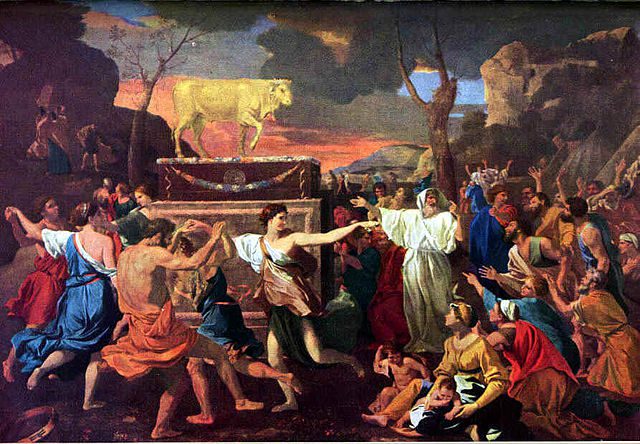Protestant writer C. Michael Patton observed (without himself believing this):
[H]istoric Protestantism has often charged the Catholic church with idolatry, believing that they have turned God into an idol of bread and wine, worshiping the elements without, indeed, contrary to, a scriptural basis.
. . . which is an utterly wrongheaded criticism, as I have often argued, since idolatry, by definition, is a matter of the heart and interior disposition. No minimally informed Catholic has ever worshiped mere bread and wine (just as none have been dumb and absurd enough to actually venerate plaster in the form of a statue of a saint). We are worshiping Jesus Christ present in what was formerly bread and wine.
Obviously, other Christians may deny the fact of what we believe in faith to be taking place, but whatever the Mass is, it is not idolatry, which is worship of what is not God and raising something other than God to His sole place of supreme exaltation.
Clearly, Catholics aren’t doing that, which is simple to see in the literal meaning of the word transubstantiation: “change of substance.” Think about it for a moment in this light: how does the following “logic” of our anti-Catholic critics make any sense?:
1) Catholics believe in transubstantiation.
2) Transubstantiation means, literally, “change of substance.”
3) In this instance the substance change involves bread and wine being transformed into the Body and Blood of Jesus Christ.
4) Therefore, Catholics believe that bread and wine are no longer present; only the Body and Blood of Christ.
5) And the adoration of the host and eucharistic worship takes place after the consecration and change of substance in the Mass.
6) Nevertheless, we will accuse Catholics of worshiping bread and wine instead of Jesus Christ, which is gross idolatry, and no part of legitimate Christianity.
Obviously, #6 doesn’t follow, based on the premises of #2-#5. So how is it we get accused of idolatry, when the very word that describes the practice being so critiqued proves that it is not taking place at all? If anything, Lutheranism would be more open to this accusation, on the grounds that they might conceivably confuse the elements with Jesus (I would not make the charge myself, I hasten to add, but I am making an observation based on anti-Catholic premises).
But that is not true in our case, by the fundamental definition of a complete change taking place, as we believe. So again, one can disagree with what Catholics (with virtually unanimous patristic support) believe in faith to be occurring, but it is ludicrous — utterly illogical and empty-headed — to accuse us of idolatry in the Mass.
* * * * *
I had the following fun exchange with fellow Catholic Stephen Korsman (his words in blue, too) in the combox:
I’ll play devil’s advocate. If Protestants are right, then the bread and wine are nothing more than bread and wine. In that case, since we’re worshipping what we think is Jesus but is not Jesus, is that not idolatry?
It’s still not for us (and it has to be “for us” in the case of idolatry, because it flows from the heart: what we ourselves believe), and if in our hearts we believe it is Jesus and not bread and wine, then we are worshiping Him, regardless of whether there was in fact a change or not. We would still be worshiping Jesus in any case. If it’s still bread and wine, we are worshiping what we believe to be Jesus.
We’re simply not worshiping bread and wine. No Catholic who knows anything has ever done that. It would be ludicrous and gross idolatry. No Catholic teacher in history has ever said that Catholics worship bread and wine. It’s ridiculous to even have to note this (to critics).
Likewise, Protestants who don’t in fact possess the Real Presence (like Lutherans) are still pious if serious about Holy Communion and not engaging in idolatry, even though what is taking place is not what they believe takes place.
Okay. I see your point. But look at it this way, and assuming the Protestant view is correct:
Catholic thinks a statue of a cow is Jesus.
Catholic worships this statue of a cow, thinking it’s Jesus.
Is the Catholic committing idolatry?
Catholic thinks the bread and wine is no longer bread and wine, but the Body and Blood of Jesus.
Catholic worships this item, thinking it’s Jesus.
Is the Catholic committing idolatry?
I don’t see how the answers can be different. At least, I don’t see how the answers can be different assuming Catholics are wrong about the Eucharist.
If they think the cow has become transformed into Jesus by “transubcowtiation” then it wouldn’t be idolatry, by analogy. If they think it has not undergone the miraculous change, then it would be, since a cow is obviously not God in the flesh in any way, shape or form.
If you (or anyone) want to make that comparison, then you have to include the essential aspect of “change” (“trans”) with it, and that’s where the attempted disanology fails.
In the case of the golden calf, on the other hand, the ancient Hebrews appear to have literally believed that it was God, without any such miraculous change, and that was plainly idolatry, as the Bible makes clear.














